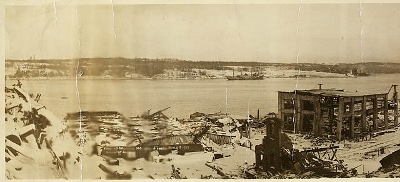Halifax Explosion National Historic Event
Halifax, Nova Scotia

Historic photograph
© Library and Archives Canada | Bibliothèque et Archives Canada, C-019944, C-019948, C-019953
Address :
Halifax, Nova Scotia
Recognition Statute:
Historic Sites and Monuments Act (R.S.C., 1985, c. H-4)
Designation Date:
2016-05-02
Dates:
-
1917 to 1917
(Significant)
Other Name(s):
-
Halifax Explosion
(Designation Name)
-
Halifax’s “darkest day”
(Other Name)
Importance:
SS Mont Blanc and SS Imo collision caused the largest man-made explosion prior to the atomic bomb. It had profound and long-lasting consequences; national and international outpouring of aid and support followed.
Plaque(s)
Existing plaque: Fort Needham Memorial Park, Halifax, Nova Scotia
On December 6, 1917, the explosives-laden SS Mont-Blanc and SS Imo collided in Halifax Harbour, causing a massive explosion, a tidal wave, and fires. Some 2,000 people died and thousands more were wounded. The unprecedented devastation produced a tremendous local, national, and international outpouring of support, as first responders acted swiftly. The number of serious injuries led to advances in medical treatment, notably in pediatric surgery, and contributed to the creation of the Canadian National Institute for the Blind. Destroyed neighbourhoods were rebuilt to safer standards and innovative urban designs.